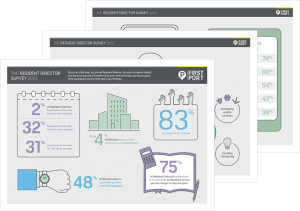01 March 2023
Understanding the evolving requirements of managing a residential development, whilst ensuring residents have the reassurance of good financial planning, are among the key focus areas for Resident Directors in 2023, according to FirstPort’s third annual Resident Director Survey.
With more than 40 years’ residential property management experience and over 1,600 resident-managed developments in our care, the survey is believed to be the biggest annual proprietary research project undertaken with Resident Directors in England and Wales. This report builds on last year’s findings, considers the growing and changing priorities for Resident Directors, and what managing agents can do to best support them.
![]()
As leasehold reform continues to be debated, residents await the completion of cladding remediation, and households keep a closer eye on their finances in a challenging economic climate – Resident Directors certainly have a lot on their plate. But with change, comes opportunity and never has there been a more pertinent time for homeowners to have more control and say over their living spaces by becoming a Resident Director.
It’s a chance for residents to play a key part in the way their development is run, representing their communities to directly influence the way their homes are cared for.
What are Resident Directors’ main concerns?
Resident Directors across the country manage the care of their developments on behalf of their fellow residents. However, the responsibility of being a Resident Director goes far beyond the day-to-day upkeep and maintenance of a development. They must keep a finger on the pulse of changing legislation, as well as agile reserve fund planning.
One new significant legislation change that undoubtedly stands out this year is the new requirements for ‘responsible persons’ in relation to fire safety, which came into effect in January 2023, in line with The Fire Safety (England) Regulations 2022.
With new fire safety legislative requirements increasing development spend, coupled with UK-wide cost of living pressures, it is no surprise that Resident Directors told us their residents are placing greater importance on maintaining a healthy reserve fund, ensuring control over service charge monies and how they are spent.
![]()
Factors such as these can add layers of complexity to the work of Resident Directors. Of those surveyed, 45% of Resident Directors felt they did not understand the role well, with almost half (48%), saying the role took up more time than they expected.
However, Directors continue to rise to these challenges, with 75% telling us they understand and contribute to decisions on how service charge monies are spent. In doing so, a collaborative approach can be an effective way forward – when asked which of their duties they spend the most time on, 23% said liaising with their property manager, while 15% spend the most time communicating with fellow Directors. While these figures are encouraging, in these challenging times, when stakeholders are keeping a closer eye on money matters, communication and collaboration is more important than ever, to ensure that the requirements and priorities of developments continue to be met.
Changing priorities
![]()
For any individual or organisation that manages a residential property, ensuring the site is maintained to the standards that residents expect remains a fundamental part of their duties. In residential developments, planned maintenance related to communal areas – whether low impact or major works programmes – are typically funded by the service charge.
When asked which of their responsibilities concerned them most, 68% of Directors cited ensuring the service charge budget is accurate – up 20% from 2022, while 38% also prioritised ensuring they maintained a healthy reserve fund (up 4%). However, while 43% named repairs and maintenance among their priority areas, this was down 14% on the previous year.
For some Directors, this change may reflect repairs recently completed, and where maintenance is generally under better control compared to a year ago. For others, it could suggest greater concerns over more significant maintenance works to come.
While essential maintenance, which ensures the safety and functionality of the site will always be non-negotiable, this possible shift in priorities could suggest residents are willing to delay a fresh coat of paint, or garden upgrades, to ensure they are prepared for more critical works.
Sustainability and environmental aspirations
![]()
Like many organisations across the UK, Resident Management Companies (RMC) and Right to Manage Companies (RTM) are becoming increasingly conscious of their impact on the environment.
In this year’s survey, we asked Directors which sustainable features and practices they and their fellow residents were interested in pursuing. Among the most popular responses were increased opportunities to recycle, landscaping outdoor areas, planting trees and wildflowers, as well as developing wildlife corridors.
In addition, as households around the country look for ways to reduce their expenditure, Directors also reported a strong interest in switching to more energy-efficient solutions that carry eventual cost savings, such as LED lighting and electric vehicle charging.
How can Resident Directors be best supported?
When asked for words that best described being a Resident Director, ‘proud’, ‘rewarding’ and ‘satisfying’ were among the more positive choices. However, the most common words to emerge were along the themes of ‘frustration’ and ‘responsibility’, with both words (including variants) each accounting for 12% of responses.
![]() Accordingly, when asked how satisfied respondents were in their roles, 37% said they were not currently satisfied, with many citing time constraints, as well as a lack of understanding of their duties. With 45% of Directors citing a lack of understanding of their role, 71% say they spend up to 10 hours a month on their duties, with 10% dedicating over 20 hours. In the coming months, with increasing pressures on households, evolving legislation, and political debate suggesting further change, dedicated, professional support is more important than ever.
Accordingly, when asked how satisfied respondents were in their roles, 37% said they were not currently satisfied, with many citing time constraints, as well as a lack of understanding of their duties. With 45% of Directors citing a lack of understanding of their role, 71% say they spend up to 10 hours a month on their duties, with 10% dedicating over 20 hours. In the coming months, with increasing pressures on households, evolving legislation, and political debate suggesting further change, dedicated, professional support is more important than ever.
What does the future look like for Resident Directors?
The report shows that the majority of Directors remain committed to leading the care of their development – 83% of Resident Directors volunteered to take on the role, with only 4% of respondents carrying out a similar role at more than one site.
For the second successive year, 59% of respondents said they expect to remain in their role beyond the next three years.
Consistency in the position is of significant benefit to both fellow Directors and residents. Years in post allow Directors to learn and develop their knowledge (31% have been in post for 10 years or more), whilst providing support to less experienced Directors, including 32% of respondents, who have been in the role for three years or less.
![]()
At a time of change, the stability and continuity that comes from having long-standing Directors can help put residents at ease, whilst providing experienced leadership.
However, with 48% expressing that they give more time to their role than they expected, ensuring Directors are sufficiently supported is vital, particularly with continued complexity around matters such as fire safety and building remediation.
Professional Property Management Support
Professional property managers provide extensive experience and dedicated resource in all aspects of managing residential developments, including the management of estate finances, and all areas of maintenance, from day-to-day repairs to large scale, complex projects – including compliance with processes such as Section 20 for major works projects.
Property managers can provide up-to-date guidance on the issues that affect Directors and their residents, as well as the resources to put adequate solutions in place, including keeping developments compliant with the latest health and safety regulations. In doing so, Resident Directors and property managers can work together to ensure residents’ requirements are met, and their ambitions are fulfilled, whilst ensuring they remain happy and safe in their homes.
About FirstPort
We understand the responsibilities, pressures and complexities that property management creates for Resident Directors. We’re here to help Directors of Right to Manage (RTM) Companies and Resident Management Companies (RMC), as well as Residents Associations, to successfully navigate their duties and make sure their homes are a great place to live for their neighbours and communities.
With over 40 years’ experience, FirstPort works with over 1,600 resident managed developments across the UK, helping RTM and RMC Directors meet their management and legal obligations, all while delivering a great service for residents too.
To find out more, simply fill in the form and we’ll be in touch within one working day.
"*" indicates required fields












